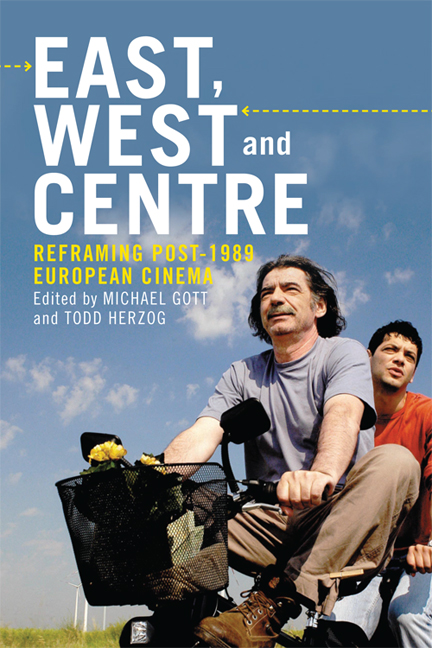Book contents
- Frontmatter
- Contents
- List of Figures
- Notes on Contributors
- Acknowledgements
- Introduction: East, West and Centre: ‘Mapping Post-1989 European Cinema’
- Part I Redrawing the Lines: De/Recentring Europe
- 1 The Berlin Wall Revisited: Reframing Historical Space between East and West in Cynthia Beatts's Cycling the Frame (1988), The Invisible Frame (2009) and Bartosz Konopka's Rabbit à la Berlin (2009)
- 2 Changing Sides: East/West Travesties in Lionel Baier's Comme des voleurs (à l'est)
- 3 Dubbing and Doubling Over: The Disorientation of France in the Films of Michael Haneke and Krzysztof Kieślowski
- 4 Challenging the East–West Divide in Ulrich Seidl's Import Export (2007)
- 5 Fatih Akın's Filmic Visions of a New Europe: Spatial and Aural Constructions of Europe in Im Juli/In July (2000
- 6 Salami Aleikum – The ‘Near East’ Meets the ‘Middle East’ in Europe
- 7 Cinematic Fairy Tales of Female Mobility in Post-Wall Europe: Hanna v. Mona
- Part II Border Spaces, Eastern Margins and Eastern Markets: Belonging and the Road to/from Europe
- Part III Spectres of the East
- Notes
- Bibliography
- Index
5 - Fatih Akın's Filmic Visions of a New Europe: Spatial and Aural Constructions of Europe in Im Juli/In July (2000
from Part I - Redrawing the Lines: De/Recentring Europe
Published online by Cambridge University Press: 05 September 2016
- Frontmatter
- Contents
- List of Figures
- Notes on Contributors
- Acknowledgements
- Introduction: East, West and Centre: ‘Mapping Post-1989 European Cinema’
- Part I Redrawing the Lines: De/Recentring Europe
- 1 The Berlin Wall Revisited: Reframing Historical Space between East and West in Cynthia Beatts's Cycling the Frame (1988), The Invisible Frame (2009) and Bartosz Konopka's Rabbit à la Berlin (2009)
- 2 Changing Sides: East/West Travesties in Lionel Baier's Comme des voleurs (à l'est)
- 3 Dubbing and Doubling Over: The Disorientation of France in the Films of Michael Haneke and Krzysztof Kieślowski
- 4 Challenging the East–West Divide in Ulrich Seidl's Import Export (2007)
- 5 Fatih Akın's Filmic Visions of a New Europe: Spatial and Aural Constructions of Europe in Im Juli/In July (2000
- 6 Salami Aleikum – The ‘Near East’ Meets the ‘Middle East’ in Europe
- 7 Cinematic Fairy Tales of Female Mobility in Post-Wall Europe: Hanna v. Mona
- Part II Border Spaces, Eastern Margins and Eastern Markets: Belonging and the Road to/from Europe
- Part III Spectres of the East
- Notes
- Bibliography
- Index
Summary
‘Europe as such does not exist,’ states sociologist Gerard Delanty in his article ‘What does it mean to be a European?’ (11, 19). It is a discursive construction (Elsaesser, 48; Hudson, 409). Various disciplines, organisations, and interest groups such as the European Union, political parties, and academic disciplines have repeatedly (re)constructed and (re)defined Europe and things European. The recent building ban on minarets in Switzerland and the outlawing of the hijab (veil) in French schools warrant once again the revaluation of the changing sights and sounds of Europe. Cinema provides one way of imagining concepts of Europe (Sieg, 2, 62). The films of Turkish-German director Fatih Akın offer current, popular examples for cinematic evaluations of Europe and Europeanness. Turkey's role in this new Europe becomes relevant, especially considering the recent protests (starting in the summer of 2013) in Turkey against socially conservative prime minister Recep Tayyip Erdoğan and the solidarity that was shown across Europe, including a YouTube video by Akın, for the protesters.
In this chapter, I analyse two audio-visual aspects of Akın's In July: space and sound. The first part discusses the spatial conceptions of Europe (city and landscapes) and the second, the sounds of Europe (music and languages). Both of which, ultimately, construct Akın's cinematic visions of a diverse and connected Europe. Akın, the recipient of the European Parliament's first Cinema Lux Prize in 2007 for Auf der anderen Seite The Edge of Heaven (Germany/Turkey/Italy) is arguably one of the most prominent directors in Germany and Europe today, whose films challenge solidified binaries such as East/West and centre/margin. According to the 2007 president of the European Parliament, Hans Gert Pottering, the EP awards ‘annually a film that raises attention to current social questions that affect our continent and highlights European Integration especially’. Furthermore, the film should ‘highlight the richness of linguistic diversity within the European Union’. Akın's filmic Europe is a diverse, interconnected space, in which multi-ethnicity and multilingualism are prominent in a variety of regions that have often been seen as historically and politically distinct.
In the field of cultural geography, Doreen Massey conceptualises space as a perpetually changing entity which comes into being through multiple interconnections of people, places and things material (Massey 2005: 9, 13). Following Massey, I perceive Europe as a changing entity with various dynamic interconnections.
- Type
- Chapter
- Information
- East, West and CentreReframing post-1989 European Cinema, pp. 79 - 94Publisher: Edinburgh University PressPrint publication year: 2014



